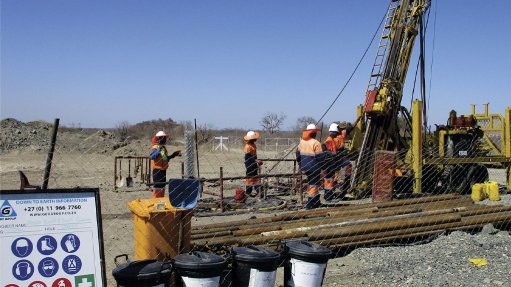
AWAITING THEIR RETURN There are many exploration companies in South Africa – many drill rigs and people are waiting to get back to work
Multiple elements are slowing down exploration activity in South Africa. “There have been pockets of activity but, overall, the industry has slowed down to a point where retrenchments are rife and new investment is slow to materialise,” says South African exploration and geotechnical services provider GeoGroup founder Dave Rossiter.
He notes that the weaker rand has played “a major role” in increasing the costs of local mineral extraction, however, it has also resulted in the boosting of margins of companies exporting raw minerals, which has facilitated their survival in a declining mining sector.
While commodity prices are set by international markets, the costs of producing materials are affected by local economic factors, such as the cost of labour and the efficacy of the local content environment, Rossiter explains.
Nevetheless, he notes that international prices appear to be in line with prices for exploration services in South Africa. “Establishments in remote areas push the international prices up for South African contractors,” he comments, adding that this results in near parity.
“South Africa is no different from the rest of Africa, which is endowed with the richest deposits of minerals in the world.”
However, Rossiter points out that “very little exploration has been done, relative to the potential of new discoveries on the African continent”.
He notes that the investment case for local exploration is good and, if one considers the value chain and the opportunties for beneficiation, then “the resulting potential for job creation is certainly one to consider as a long-term value-add for the country”.
Areas for Improvement
To unlock South Africa’s mineral potential, the country needs to re-examine its ability to attract investors and ways of facilitating greater investment.
Therefore, factors such as policy, the removal of red tape for startup businesses, foregoing company tax for new companies in the first two years and fostering integrity among civil servants to root out corruption, need to be considered.
“If we can shape our future based on sensible laws – ones proven to produce the desired socioeconomic results – then we will attract investors to the benefit of the country through not only foreign direct investment but also employment opportunities.”
He comments that some of the most desired investment destinations in the world have the highest tax rates, but investors are more than willing to invest because of the stable political environment and the reliable minerals policy and tax regime.
Rossiter stresses that protracted processes to implement and finalise new legislation causes uncertainty, particularly in mining.
He states that, if government can facilitate investment by addressing these issues, investors and the private sector will do the rest.
“Let us make beneficiation a role-player in the future. We should embrace disruptive technologies and understand that, unless we make sensible changes and look at the problem from the investor’s perspective, we won’t succeed in securing employment and we will not succeed in reigniting our exploration industry.”
Rossiter highlights the importance of credibility, adding that, since investors’ perspectives of investment destinations are determined over time, “there is no quick fix to the time-related damage caused by ignorance and corruption. “We have to make the changes quickly and come up with a set of rules that works for all and then leave them in place.”
Status Quo vs Way Forward
Rossiter adds that a lack of new exploration activity ensures no new investor interest in the mining industry, which desperately needs the exploration sector to reignite, thereby guaranteeing its survival.
“There are many exploration companies in South Africa – many drill rigs – and people are waiting to get back to work. It is up to government to make the right choices and chart the way forward.”
Further, while some exploration companies have closed down or have relocated to other African countries because of the state of the local industry, Rossiter believes that, should there be reinvestment, many of those companies will return. The companies that are still here “will bounce back once the industry changes for the better”.
Rossiter believes that an integrated solution – which ensures that everyone benefits and results in the country becoming a desired investment destination – needs to be found.
“Fixing exploration will start a wave of positive reactions and help solve many social problems; as participants in the exploration industry and patriots of South Africa, we wait in anticipation,” he concludes.